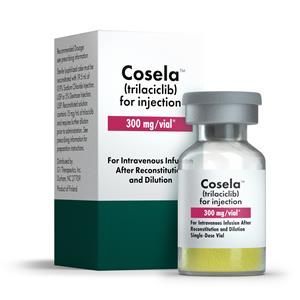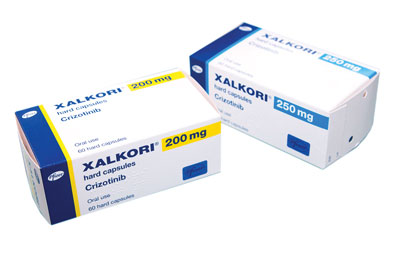Cosela (trilaciclib) vs Xalkori (crizotinib)
Cosela (trilaciclib) vs Xalkori (crizotinib)
Cosela (trilaciclib) and Xalkori (crizotinib) are used to treat different types of cancer and have distinct mechanisms of action. Cosela is a cyclin-dependent kinase inhibitor designed to protect bone marrow cells from damage caused by chemotherapy, and it is used in patients with extensive-stage small cell lung cancer. In contrast, Xalkori is a tyrosine kinase inhibitor specifically targeting ALK and ROS1 receptors, and it is used for the treatment of non-small cell lung cancer with specific genetic alterations. Patients should consult with their oncologist to determine which medication is appropriate based on their specific type of cancer and genetic profile.
Difference between Cosela and Xalkori
| Metric | Cosela (trilaciclib) | Xalkori (crizotinib) |
|---|---|---|
| Generic name | Trilaciclib | Crizotinib |
| Indications | Used to decrease the incidence of chemotherapy-induced myelosuppression | Used to treat non-small cell lung cancer (NSCLC) and anaplastic large cell lymphoma (ALCL) |
| Mechanism of action | CDK4/6 inhibitor that helps protect bone marrow cells from damage caused by chemotherapy | ALK and ROS1 tyrosine kinase inhibitor that interferes with the growth and spread of cancer cells |
| Brand names | Cosela | Xalkori |
| Administrative route | Intravenous | Oral |
| Side effects | Fatigue, hypocalcemia, hypokalemia, hypophosphatemia, increased aspartate aminotransferase | Visual disorders, gastrointestinal effects, edema, elevated transaminases, neutropenia |
| Contraindications | Patients with a history of severe hypersensitivity reactions to trilaciclib | Patients with a history of severe hypersensitivity reactions to crizotinib or any of its excipients |
| Drug class | Cyclin-dependent kinase inhibitor | Tyrosine kinase inhibitor |
| Manufacturer | G1 Therapeutics | Pfizer |
Efficacy
Cosela (Trilaciclib) for Lung Cancer
Trilaciclib, marketed as Cosela, is a novel therapeutic agent that has shown efficacy in the management of small cell lung cancer (SCLC). It is a cyclin-dependent kinase 4/6 (CDK4/6) inhibitor that is specifically designed to protect bone marrow from damage caused by chemotherapy. In clinical trials, Cosela has been evaluated for its ability to reduce the incidence of chemotherapy-induced myelosuppression in patients undergoing treatment for SCLC. By preserving bone marrow function, Cosela aims to help patients maintain their chemotherapy regimen on schedule and at the proper dose, potentially improving outcomes.
The efficacy of Cosela in lung cancer was demonstrated in several clinical trials. In these studies, patients with extensive-stage SCLC who received Cosela before chemotherapy showed a significant reduction in the duration and severity of neutropenia, a common and serious side effect of chemotherapy. Neutropenia is a condition characterized by low levels of neutrophils, a type of white blood cell essential for fighting infections. By reducing the risk of neutropenia, Cosela helps to lower the likelihood of infection and the need for antibiotics or hospitalization, thereby supporting the overall treatment process.
Xalkori (Crizotinib) for Lung Cancer
Crizotinib, sold under the brand name Xalkori, is a targeted therapy that has been approved for the treatment of non-small cell lung cancer (NSCLC) with specific genetic alterations. It is an anaplastic lymphoma kinase (ALK) inhibitor that has shown efficacy in patients whose tumors express the ALK gene fusion. Crizotinib works by blocking the activity of the ALK protein, which can promote the growth and spread of cancer cells. In addition to ALK, crizotinib also inhibits the c-MET/HGF receptor tyrosine kinase, which has been implicated in the pathogenesis of various cancers, including NSCLC.
The efficacy of Xalkori in treating ALK-positive NSCLC has been established through multiple clinical trials. In these studies, crizotinib has demonstrated a significant improvement in progression-free survival compared to standard chemotherapy regimens. Moreover, response rates have been high, with many patients experiencing tumor shrinkage. Crizotinib has also been studied in patients with ROS1-positive NSCLC, where it has shown considerable anti-tumor activity. The use of Xalkori is typically reserved for patients who have been tested and found to have the appropriate genetic biomarkers that predict a response to this targeted therapy.
Regulatory Agency Approvals
Cosela
-
Food and Drug Administration (FDA), USA

Xalkori
-
European Medical Agency (EMA), European Union

-
Food and Drug Administration (FDA), USA

-
Health Canada

-
Pharmaceuticals and Medical Devices Agency (PMDA), Japan

-
Therapeutic Goods Administration (TGA), Australia

Access Cosela or Xalkori today
If Cosela or Xalkori are not approved or available in your country (e.g. due to supply issues), you can access them via Everyone.org.
How it works

Make an enquiry
Choose the medicine you want to buy, answer a couple of questions, and upload your prescription to speed things up. We’ll get back to you within 24 hours.


Make an enquiry
Choose the medicine you want to buy, answer a couple of questions, and upload your prescription to speed things up. We’ll get back to you within 24 hours.


Breeze through the paperwork
We'll guide you through the required documents for importing unapproved medicine, ensuring you have all the necessary information.


Get a personalized quote
We’ll prepare a quote for you, including medicine costs and any shipping, administrative, or import fees that may apply.


Receive your medicine
Accept the quote and we’ll handle the rest - sourcing and safely delivering your medicine.

Some text on this page has been automatically generated. Speak to your physician before you start a new treatment or medication.
Let's talk
If you have any questions, call us or send us a message through WhatsApp or email:
Contact us




